
|
Return to Civilian Life My return to “civi (civilian) street” started not long after I left Intrepid in January 1971, when I was posted to the Royal Marine Barracks, Eastney, Portsmouth. When I got there, because I had done two commissions, I was rewarded with a cushy (easy) job, which was “Bedding Storeman” for the Band and Drums Company. I was the only Marine in the Company apart from the Company Commander, who was also the Barracks Adjutant. I got on well with him. My first encounter with him was when the Company was on leave, and, having very little to do with everyone gone, I would often go down to the beach as the barracks were on the seashore. On my way back for lunch one day, wearing shorts and a T-shirt, I was approached by someone who, while not in uniform, was obviously an officer. He stopped me and asked where I had been and, digging deeper, which Company I was with. I told him that I was with the Band and Drums and that they were on leave. Then he asked if I was on leave and, when I said I wasn’t, he ordered me to report to the Adjutant and began to walk off. I had to stop him and ask who I should say sent me. “The Commanding Officer”, he replied. When I reported this to the Adjutant, he found the incident very funny and took a liking to me. When the post of Company Pay Clerk became vacant, he offered me the position. From the beginning, I thought that I started at 8:30, so I would turn up at 8:25, as a good Marine is always five minutes early. But, during our office Christmas dinner, I found out that we actually started at 8:00. I had noticed that everyone was there when I turned up each morning, but no one had said anything to me until then. I didn’t change my timings. In my last year in the Marines, the Tricorn Club in Portsmouth became an important part of my life. I was in my room in the Barracks one day when one of the guys asked me if I was doing anything that evening. When I said that I wasn’t, he asked if I wanted to earn a bit of money at the door of a nightclub. I agreed and so started my part-time job as a bouncer. Luckily, I didn’t have to do much bouncing - I was able to talk most people out of causing trouble. I learnt that generally, people didn’t get aggressive if you approached them in a calm and friendly manner. If, however, you adopted a confrontational and threatening demeanour, they would become aggressive and a fight would develop. That was a lesson that held me in good stead over the years and on quite a few occasions I was able to placate people and avoid any conflict. During my year at the club, I only had one fight and that was with one of Portsmouth’s “hard boys”. The fight started at the top of the stairs and finished halfway down. Fortunately, someone stepped in and stopped it. I say, fortunately, as by then I was starting to get the worst of it. I carry a scar on my upper lip to this day. After that incident, however, if I said to someone, “You can’t come in” or “You had better leave”, they left without a word. I enjoyed my time working at the Tricorn Club. I got on well with the other staff and the customers, many of whom were regulars. After a few months, I was made Box Office Manager and was responsible for the engagement of the door staff and arranging the work rotas. A few of the local “hard boys” became unofficial bouncers, in that, if I ever needed backup, they would provide it. I even rigged up a light in the club which, when switched on, was a call for assistance. If things got awkward at the door, we would switch the light on, and several of the guys would suddenly appear, which had a remarkably calming effect on anyone wanting to cause trouble. During my time at Eastney, the Barracks did have a number of VIP visits, which included one from Prince Philip, the Duke of Edinburgh, husband of Queen Elizabeth. 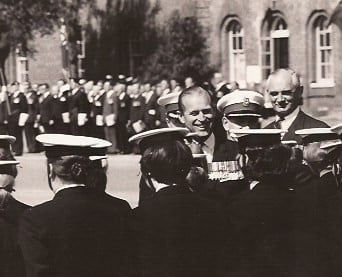 Prince Philip visits Royal Marine Barracks Eastney
It was times like that that everyone gets involved, even the Bedding Storeman for the Band and Drums, so I was roped into the additional duty as a member of the Drill Display Team. From what I remember, his visit went well, as did our Display, but having to be on the Drill Display convinced me that I was ready to leave the military and be in control of my own life. While employed by the Tricorn Club, I worked six nights a week, and that was also my social life. I was earning money and hardly spending any of it. When the club manager found out that I was leaving the Marines, he offered me a full-time job there, but I had made up my mind on what I was going to do. I had saved enough money to set myself up in business. Throughout my service, I had been considering my life after the Marines and had considered many options. But I had been working, helping to fix up properties during my leave time and had decided that that was what I wanted to do for a living. I had been researching the property market in Lincoln and had even bought a minivan to carry my tools and materials for the work. It was after the visit of Prince Philip that I decided I was going to apply for my premature discharge. I had determined that the time was right for me to return to civilian life. The Marines had a system whereby you could purchase your discharge before the term of your engagement had expired, the cost at that time was £100 which is about £1,300 in 2023 money. I was required to put in my application for discharge and then appear in front of a senior officer. I was expecting all sorts of awkward questions, but I was asked just two: What was I going to do, whereon I said that I wanted to develop property by buying, modernising and then selling houses. The second question he asked was if it was lucrative, and I replied that it was. “Application approved” was his response. I had been told that your discharge was very rarely approved on your first application, but mine was. I did wonder if my time in the Naval Detention Quarters had had any influence on that decision. On leaving the Marines in February 1972, I returned to Lincoln and moved back into my family home. I always got on well with my parents. I was the apple of my mother's eye, and my father supported me in anything I did, so moving back wasn’t a problem. Most of my time was taken up working anyway, which amounted to 15 hours a day, seven days a week. Like a lot of moves in my life, going into the property development business felt predetermined. I owe that to Stuart Edinburgh from 41 Commando. He lived near me, so when we went home on leave, we tended to travel on the same train. One time when returning from leave, he suddenly got up, rushed out of the carriage, and returned with a young lady, which really impressed me. It turned out he had been up a few weeks previously and met her on the train then. Her name was Joan and her parents had just moved to Birmingham. I mentioned that I had a friend in Birmingham and that, if she would give me her phone number, I’d give her a call sometime when I was there, which she did. Later, Stuart asked if I really wanted her number or if he could have it. I gave it to him and a couple of weeks later he went up to see her and they started a relationship. Stuart eventually married Joan and I was delighted to be the best man at their wedding. 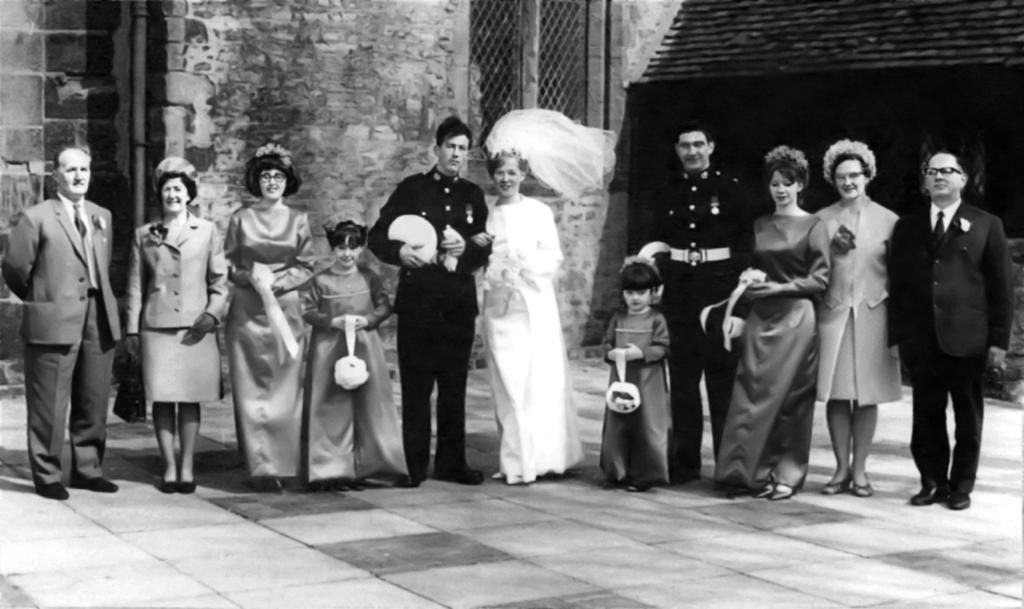 Stuart and Joan's Wedding with their parents and Joan's sisters as bridesmaids.
It turned out that her parents had moved into a house that needed renovation and, as Stuart had worked in the building industry, he was able to do it. On one job, he needed a hand and asked if I’d help him. I wasn’t that keen until he mentioned that she had an attractive sister. So, I began assisting him on a regular basis and, in the process, learned a great deal about repairing and renovating properties. We soon found that other people were asking us to do work for them, something we did have to restrict ourselves on. It did, however, give me a good understanding of the requirements regarding property repairs. In early 1972, I bought a terrace house that needed a considerable amount of renovation work. It had no bathroom, it had dry rot and needed rewiring, replastering, and numerous other repairs and renovations. Most of the work I did myself using the skills I learnt from Stuart, but if I needed to, I would bring in other specialists. I bought my first property for £600 and sold it for £2,000. I then used that money to buy two more properties and repeated the process. So began my career in property development. As with most things in life, it is not just what you know, it is also who you know, so I made a real effort to get to know the area estate agents and establish a good working relationship with them. After a while, they would contact me if they had a property that they thought I might be interested in, so on many occasions, I was able to buy a property before it even got put on the market. Some agents became friends, and we would meet frequently at social events held for the Round Table or Lions. On leaving the Marines, I was able to grow my hair and a long moustache, a look which was very popular in the 70s. Me in 1972
For several years I did extremely well. I bought numerous properties, specialising mainly in small terrace houses that needed modernising. Grants were available and the local authority was giving mortgages. Initially, I was doing all of the work myself but, as business increased, I began employing other people. I had offices and a very nice house. Life was good. Although I was working very long hours, sometimes seven days a week, I did manage to have a social life and I extended my interest in folk music that I had acquired while in Aden. When the person who managed the local folk club decided to call it a day, I offered to take it on. The club was called Turk’s Head and was located just outside The Bail, near the Newport Arch in Lincoln. I had become friends with several of the local resident singers. One of them, Mo Robinson, along with his wife Crysse, would invite people back to their place for coffee when the club finished for the evening, so we became good friends. It wasn’t just one day a week either, as we had a very active social group, with a party most weekends. Managing the club led to me managing some of the artists, which in turn gave me the opportunity of producing a couple of records for the people that I managed. Life for me was very good. My success came to the attention of the Lincolnshire Echo, our local newspaper, and one of their reporters interviewed me and it was published. 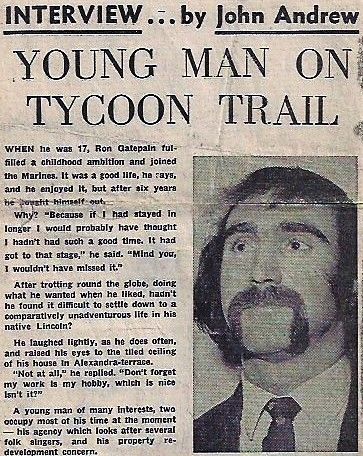 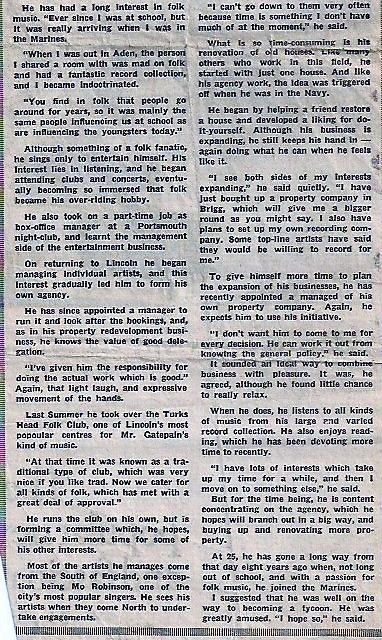 Article published in the Lincolnshire Echo Newspaper
Then came the big economic slump of the mid-1970s that lasted for several years. There was great inflation and high unemployment. The market for the type of properties I worked on dried up completely. The government ceased giving grants and the local authority stopped giving mortgages. I had several properties that I was not able to sell. I was forced to let my employees go and close my office. I sold a couple of properties at a loss to bring down some of my bank loans. I also rented out some of the properties and even sold my own home, but I was still left with a big financial problem. There were two options open to me: I could either go bankrupt or hold on and ride out the storm. I decided that I would try to ride it out, as the thought of going bankrupt was abhorrent to me. At that time, London Transport was recruiting nationally for bus drivers, so I applied and was invited down for an interview and a test drive around the block in a car. I passed both and was offered the opportunity to attend their driving course. Life was pushing me along and try as I might, I simply didn’t have many options, so in September 1975, off to London, I went. I spoke to my bank manager (as in those days it was still possible to have that kind of personal relationship) and he was happy to support me, as long as I continued to make repayments on my debts. Given the opportunity, I would rather have stayed in Lincoln. I missed my girlfriend Linda who was now 120 miles away. Also, in many ways, the job meant going back to the military lifestyle of being told what to do and when to do it, something I had gotten out of. I loved being able to decide for myself what I wanted to do - to have freedom and flexibility - something that being my own boss gave me. Nevertheless, this change was something that I had to accept. London Transport offered a good package, which included a decent basic wage with the opportunity for overtime. Initially, they gave us free accommodation in a hotel for a maximum of six months. It wasn’t exactly five-star, but it was acceptable. And the package included free transport on buses and the tube throughout London. I had no problems passing the driving course. Later, I found out that the head of the school had taken a special interest in me as he too had been in the Marines. On passing, we were sent to Holloway Garage. I was allocated the number 27 bus route, which was Archway to Richmond, although on overtime you could be on any route. Whenever I go to London, I still look at the buses to see if I have driven that route. There was plenty of overtime available and the money I earned went straight to paying off my debts. Five other guys joined London Transport at the same time as me. They were a good bunch and we got on well. So well, in fact, that when our free accommodation came to an end, we got a place together. We shared a flat for some time before each moved on to separate accommodation. I moved into a house-share with Linda’s sister and some friends. Eventually, Linda and I called it a day, so I moved out and into the YMCA. The YMCA time was quite fun as it was located in Crouch End where there was a nearby drama school. Several of its students also lived at the YMCA and we became friends. My social life included invites to many of their performances and we would also go out to the theatre and shows. In those days, bus drivers were in the cab up front, and the conductor sold the tickets in the back. You could work with different people, or you could work with the same person as a team. For some time I worked with a guy named Chris Goodwin. He had a good sense of humour and we got on very well, which made the work much more enjoyable. Chris was a very friendly person and didn’t have any problems with the passengers except for one time. On that occasion, four youths decided that they weren’t going to pay their fare and started getting nasty with Chris. He gave me the emergency signal on the bell, so I pulled up, stopped, and went round and asked the guys to leave the bus. They did and then gathered in front of Chris and me. At that point, two other guys got off the bus and stood alongside us. It was then that the four youths decided that it would be better to catch another bus and left. Chris let the two guys who had come to our assistance ride for free. Another incident worth mentioning was when I came upon a car with diplomatic plates that had been left in the middle of the street on a pedestrian crossing with the door wide open while the driver went into a nearby shop. He had blocked most of the street. I waited for over five minutes --- perhaps closer to ten --- for the driver to return, but he didn’t come back. By then, we were running late, so I decided to proceed, even though I knew that the chance of getting through the narrow space was unlikely. The bus hit the car door and took it right off! The passengers were delighted with my decision and burst into applause. At every stop for the rest of the trip, I expected someone to run up to complain that I had hit their car, or to have an angry call from the garage manager, but neither happened. 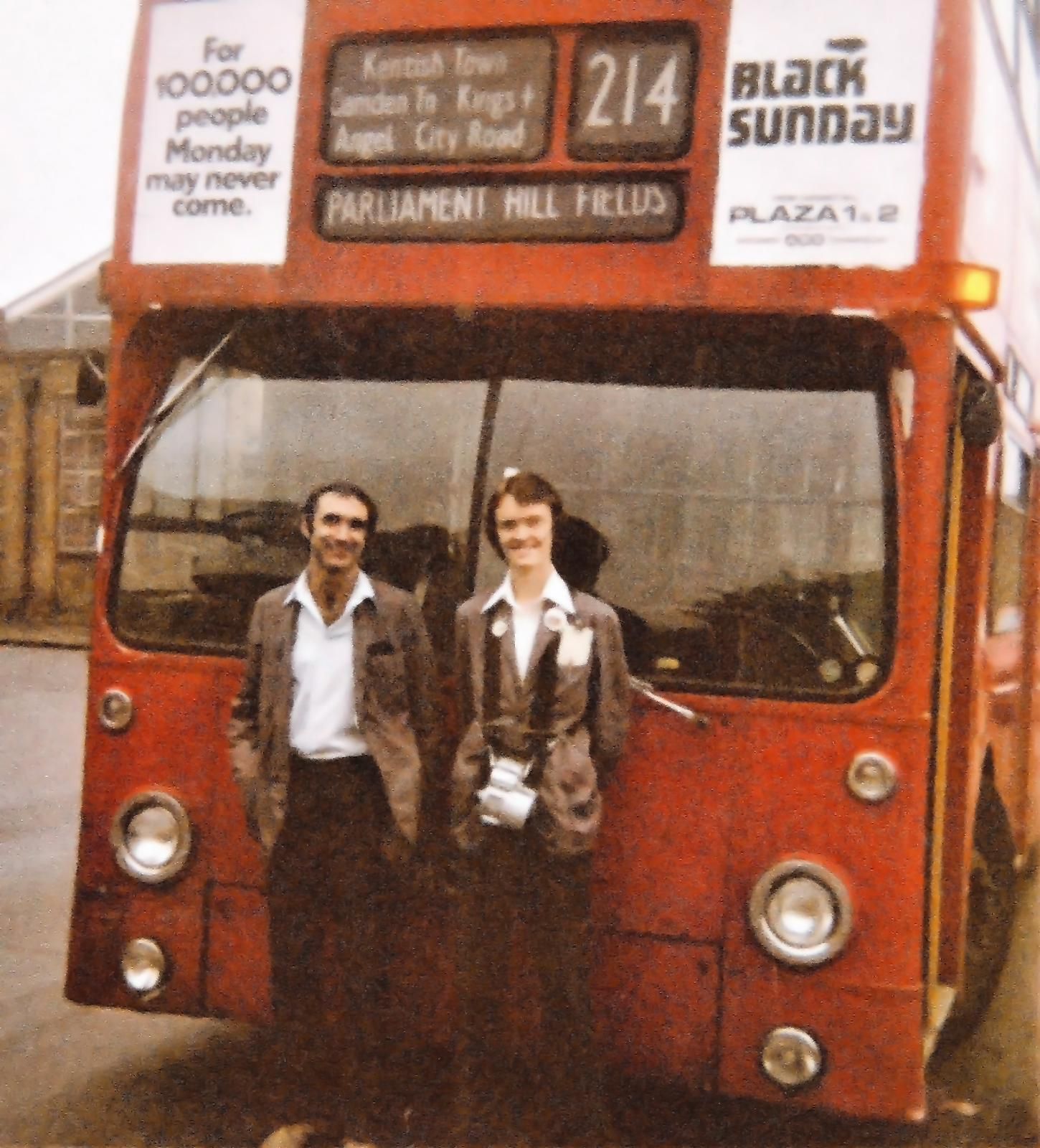 Chris and I at work with London Transport
While in London, I was able to get to many concerts and shows and, having got interested in spiritual things, in 1978 I went to the Mind and Body Show. During the show, I got talking to some people who were involved with a meditation centre not far from where I was living. Their guru had published numerous books and had an ashram in Poona, India, where people could visit and stay. I looked through a couple of his books and they looked interesting. One of the guys said he was returning to their centre soon and that he would be happy to take me to have a look. On arrival, I was shown around, and when we entered the meditation hall, I noticed a young lady sitting on the floor who looked up at me and smiled. We held eye contact for what seemed an age. After finishing my look around, I found her and we began to talk. Her name was Mary and when I told her I planned on going to India, much to my surprise, she said she would come with me, and that is exactly what happened. I went up to Lincoln to see my bank manager and told him that I wanted to go to India. He was remarkably understanding and gave me a three-month payment holiday on my loans. I returned to London and gave London Transport my notice, marking the end of my three-year tenure with them. |
|
|
|
|
| Site Map |
